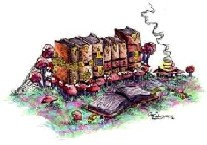Inauguro una nuova intrigante sezione sulle regole in biblioteca (cose strampalatissime quali ‘non rispondere al cellulare’ o ‘ti ho chiesto il tesserino, non un rene’) con un articolo dell’edizione europea del New York Times sulla British Library: mal comune… (ma secondo me una library può essere cool!)
London Journal
Shh! In British Library Reading Rooms, Flirting and Even Giggling
By SARAH LYALL
Published: April 28, 2008
LONDON — In its old, mustily glorious quarters in the British Museum, the British Library’s main reading room was as exclusive as it was glamorous, a club rich with tradition whose distinguished alumni included Karl Marx, Virginia Woolf, W. B. Yeats and George Bernard Shaw.
A line outside the British Library last week. Under a new admission policy, 127,000 people have passes to its reading rooms.
But in 1998 the library moved to a modern red-brick building on Euston Road, and four years ago it liberalized its admission policy. It opened its new reading rooms not only to writers and academics who depend on material from its singular collection, but also to “anyone who has a relevant research need,” a spokeswoman said.
Which is all fine. But “anyone” includes college undergraduates, and the problem with them, at least in the eyes of the older researchers, is that they tend to behave like the teenagers that many of them are.
They hog the seats.
They gather into clumps of chattering hormonal aimlessness.
They flirt, look one another up in Facebook and make complicated social plans about who will meet whom later in the cafeteria.
And to the extent that they are poring over texts, complained Tristram Hunt, a historian, professor and television personality, it is the sort of texts they intend to send to their friends across the room.
“The worst is that they actually answer their phones,” he said. “The phone vibrates and they go, ‘Hold on a minute, Nigel,’ and then they run out of the reading room and take the call.”
Researchers have been grousing about the boisterous atmosphere and crowded conditions at the British Library for years. But the dispute — a philosophical battle, really, over who should be allowed access to a great national library — spilled out in public last week when The Times of London published an article quoting various distinguished figures complaining about the out-of-control mood over spring break.
The article described how the author Lady Antonia Fraser had been obliged to wait for 20 minutes in freezing weather just to enter the building, and another 20 minutes to leave her coat at the mandatory check-in desk.
It described how another writer, Christopher Hawtree, had been “forced to perch on a windowsill” because he could not get a desk.
Claire Tomalin, a historian, was quoted as saying that the library was “full of what seem to be schoolgirls giggling” and not using the library for any necessary research purpose.
“I heard one say, ‘I’ve got to write about Islam. Can I have your notes?’ ” she said.
In a letter to the library, Lady Antonia said that while she did not object to the admission of students per se, she felt that the library had failed to address the “chaos and confusion” that came with the larger numbers.
A library spokeswoman said that the crowds were a reflection of the library’s success and that today’s researchers have a new, more interactive approach to their work.
“The library has changed and evolved, and people use it in different ways,” said the spokeswoman, who asked that, in accordance with library policy, her name not be used. “They have a different way of doing their research. They are using their computers and checking things on the Web, not just taking notes on notepads.”
With 127,000 active readers’ passes in circulation and a total of 1,480 dedicated studying seats, the library is doing its best to manage the situation, including dispatching monitors to remind members of things “like not talking in reading rooms and not leaving your books on the desk and going off for lunch,” the spokeswoman said.
The library has also installed plasma screens announcing which reading rooms are full, in the manner of municipal parking lots. But that has failed to placate the older members.
“There’s loads of people dressing like they’re in an episode of ‘Skins’ and high-fiving each other,” said Matt Taunton, a 28-year-old postdoctoral research assistant, referring to a television series about the wild and crazy lives of teenagers in Bristol.
He said he had recently asked a group of students to be quiet. “They looked at me like I wasn’t cool,” he said. “I thought, ‘This is a library — we’re not supposed to be cool.’ ”
Mr. Hunt, referring to students with iPods, said: “They’re sitting next to me with their Walkmen on, and I tell them to turn it off. I’ve become like a granddad, and I’m only 33.”
Richard Martin, 26, a first-year doctoral student, said the undergraduates were not the only group behaving badly at the library.
“The only defense is that the people I see most asleep are the old-men academics,” he said. “They turn up with a dozen books in the morning, briefly flick through one, fall asleep and then go out for a long lunch.”
Lady Antonia’s daughter Flora Fraser, 49, a biographer who was using the library the other day, said that at the Bibliothèque Nationale in Paris, readers reserve seats in advance on the Internet. That way, no one turns up at the library only to find that all the spots are taken, a common problem at the British Library.
“Actually, I really recommend it,” she said. “Maybe the answer is to get on the Eurostar and go to Paris.”




 Liber liber
Liber liber
ULTIMI COMMENTI